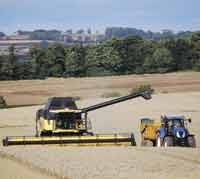Harvest roundup: Monday

Dry spells over the weekend have enabled many farmers to get on combining, although progress continues to be frustrated by showers.
In Suffolk, Andrew Maddever was cutting wheat as quickly as he could before further rain arrived.
He was pleased with both yields and quality so far, at 8.75-9.2t/ha (3.5-3.7t/acre) and 13.5% protein.
He now had 930ha (2300 acres) of wheat to combine, and reckoned harvest was about 10-15% complete in the area.
Further north, harvest was about a week later than normal at John Porter’s farm near Hull, but he hoped to finish winter barley today (3 August).
Barley yields had been pleasing, with Pelican averaging 9-10t/ha (3.6-4t/acre), and a trial plot of Volume excelling at 11.4t/ha (4.6t/acre).
North Scotland was escaping the worst of the weather, said Jim Whiteford, who had finished winter barley at Shandwick Mains, Inverness.
Harvest was about a week ahead of last year, and the earliest spring barley would be sprayed off and ready to combine by the end of the week.
In Berkshire, harvest was finally underway at Priors Farm, with initial oilseed rape yields looking promising.
“We were quite surprised – it hasn’t looked good all year, but I think it should yield 4.3t/ha (1.75t/acre),” said George Brown.
He and father Richard had cut 20ha (50 acres) of Dimension at 10.8% moisture yesterday, before moving on to contract combine organic oats at nearby Sheepdrove Farm today.
Winter wheat was underway at Richard Baker’s Walnut Tree Farm, Rochester, Kent, and yields were down by about 0.5t/acre (1.2t/ha) due to drought in the spring.
So far the 12ha (30 acres) of Hereward had only averaged 7.4t/ha (3t/acre), and other farmers were reporting disappointing results in the area, he said.
| Duxford winter wheat is an HGCA Recommended List 2009/10 variety with very high UK treated yields and a maximum 9 rating for resistance to lodging with and without PGR. Combined with the highest second wheat yield and a balanced disease resistance profile, Duxford will continue to help UK growers meet the challenge of producing more grain profitably. Go to the Syngenta Seeds website |


